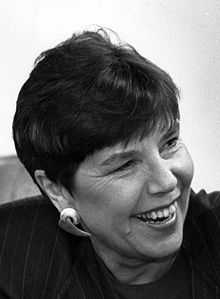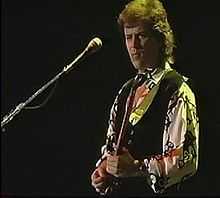South African American
| |||||||
| Total population | |||||||
|---|---|---|---|---|---|---|---|
|
South African 82,054 (South African-born, 2007-2011) [2] | |||||||
| Regions with significant populations | |||||||
| Miami, Minnesota, Illinois, Atlanta, Maryland, New York, Arizona, California, Texas | |||||||
| Languages | |||||||
| American English, South African English, Afrikaans, Zulu, Tswana, Cantonese, see languages of South Africa | |||||||
| Religion | |||||||
| Roman Catholic, Reformed Churches, Jewish, Methodism, Anglicanism, Atheism | |||||||
South African Americans are Americans who have full or partial ancestry from South Africa. According to the Organisation of Economic Cooperation and Development, there are 78,616 people born in South Africa that currently live in the United States.[3] The majority are White South African, most of them being of European ancestry (including Jews) and some with Asian (Chinese and Indian) and African ancestry.
History
Free South Africans began arriving in the United States as early as the late 19th century. The first groups were white South African (Afrikaner) miners who arrived in California. Many South Africans, typically of European Anglo-Saxon heritage, came in the mid-20th Century. Immigration by Negroids was limited. Though the standard of living for individuals of dark complexion in South Africa was higher than for most people living on the African continent, political and economic conditions still made immigration difficult, as Negroids were forced to escape to other African nations before they could emigrate to the country of their choice. Following the Soweto student uprising in 1976, there was a significant increase in South African emigration to the United States. Many of these immigrants were South African Jews who formed a community in the northern suburbs of Chicago. Although emigration policies during apartheid made immigration difficult, there were a small number of black students and political refugees who emigrated to the United States. During the 1980s and 1990s many South Africans entered the United States for political reasons, to be with family members, or to access professional opportunities not available in their home country. The largest wave of South African immigration was in 1994, after the election of Nelson Mandela as president. Many white South Africans, especially Afrikaners, emigrated out of fear because they were unsure of the changes that would come about by the acquisition of political power in the black population.[4]
The ending of apartheid brought significant waves of South Africans, in its most of British descent[5] with a significant number of Portuguese heritage.
Demography
Although the majority of South Africans who emigrated went to Australia and New Zealand, countries with similar cultural and linguistic heritages, as well as similar climates and latitude positioning were hotspots. There were also a large number of South African immigrants that went to the United States. Many white South Africans, both before and after the end of apartheid, emigrated to Midwestern states such as Minnesota and Illinois. Atlanta, Georgia, has a large population of South African Jews. Also, a number of South Africans live in New York and Mid-Atlantic states such as Maryland. Most South African immigrants in the United States are white people of European origin. Of the 82,000 South Africans that were living in this country between 2008–09, only 11,000 of them were Black South Africans.[6] In the 2000 census, 509 South African Americans reported their ethnic origins as Zulu.[7]
The majority of these immigrants are English speaking, with a moderate proportion of these being South African Jews. In the United States, South Africans in general—both white and black—live in the United States individually, rather than in communities of South African Americans.[5] Most South Africans in the United States are currently settled in San Diego, CA, approximately 20,000 people. Smaller populations reside elsewhere in the western United States, including the Pacific Northwest.
Organizations
Indaba ("discussion" in Zulu) is an example of an organization set up by South Africans to promote community involvement. It was founded in the 1990s and sponsors community events and activities. In addition, this organization allows the exchange of information through a web site and a mailing list, keeping South Africans informed about international and local events. The South African consulate in Chicago has close ties with many expatriates and hosts regular events and speakers, including an annual celebration of Freedom Day on 27 April. In 2001, the hosts founded the African Group of the U.S. Women's Action to boost the knowledge and understanding of South Africa among Americans. The South Africans are also in many other forums, such as informal parties, religious activities and rugby matches.[4]
Notable South African Americans
- Jani Allan, columnist and radio personality
- Gary Barber, producer
- Caron Bernstein, model and actress
- Rodney Howard Browne, theologian and author
- Mike Connell, professional footballer
- Colin Cowie, lifestyle guru
- Cliff Drysdale, tennis player
- David DeCastro, American football player
- Trevor Denman, thoroughbred race caller
- Arnold Vosloo, actor
- Richard W. Fisher, politician and banker
- Elizabeth Furse, US politician
- Robert Hamerton-Kelly, theologian
- Angela Hawken, academic
- Johan Kriek, tennis player
- Robert Z. Lawrence, economist
- Jason Lewis, state politician
- Lara Logan, journalist and chief foreign correspondent for CBS News
- Mark Mathabane, author
- Dave Matthews, musician
- Embeth Davidtz, actress
- Elon Musk, entrepreneur
- Daniel Mindel, cinematographer
- Victor Nogueira, soccer goalkeeper
- Andrew Parkinson, soccer player
- Andrew Pattison, tennis player
- Trevor Rabin, musician
- Jonathan Butler, musician, guitarist
- Robert Schneider, musician and producer
- Charlize Theron, model and actress
- Ben Viljoen, Boer general, politician and author
- Roy Wegerle, soccer player
- Goapele, rhythm & blues artist
- Styles P, rapper
- Gary Player, golfer
- Sasha Pieterse, an actress, most known for playing the 'missing' Alison DiLaurentis and Courtney on the ABC Family series Pretty Little Liars
- Patrick Soon-Shiong, entrepreneur
- Earl Sweatshirt, rapper
- Dave Wittenberg, anime/video games voice actor, born in a hospital in South Africa and raised in Boston.
- Nana Meriwether, Miss Maryland USA 2012, 1st Runner-Up at Miss USA 2012.
- Tammin Sursok, actor, singer, composer and guitarist.
- Roelof Botha, venture capitalist.
See also
References
- ↑ "Total ancestry categories tallied for people with one or more ancestry categories reported 2013 American Community Survey 1-Year Estimates". United States Census Bureau. Retrieved 2 September 2014.
- ↑ "PLACE OF BIRTH FOR THE FOREIGN-BORN POPULATION IN THE UNITED STATES, Universe: Foreign-born population excluding population born at sea, 2007-2011 American Community Survey 5-Year Estimates". United States Census Bureau. Retrieved 16 July 2013.
- ↑ http://www.thesouthafrican.com/news/how-many-south-africans-live-overseas.htm
- ↑ 4.0 4.1 Encyclopedia Chicago.Posted by Tracy Steffes.
- ↑ 5.0 5.1 Everyculture: South African American. Posted by Judson Knight and Lorna Mabunda. Retrieved September 2, 2012, to 2:50pm.
- ↑ New Streams: Black African Migration to the United States. Posted by Randy Capps, Kristen McCabe, and Michael Fix.
- ↑ "Table 1. First, Second, and Total Responses to the Ancestry Question by Detailed Ancestry Code: 2000". U.S. Census Bureau. Retrieved 2010-12-02.
External links
| ||||||||||||||||||||||||||||||||||||





